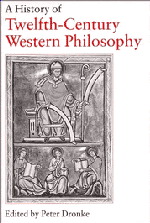Book contents
- Frontmatter
- Contents
- Preface
- Contributors
- List of abbreviations
- Introduction
- I Background
- II New Perspectives
- III Innovators
- 9 Anselm of Canterbury
- 10 Peter Abelard
- 11 William of Conches
- 12 Gilbert of Poitiers
- A note on the Porretani
- 13 Thierry of Chartres
- 14 Hermann of Carinthia
- IV The Entry of the ‘New’ Aristotle
- Bio-bibliographies
- General Bibliography
- Index of Manuscripts
- General Index
A note on the Porretani
Published online by Cambridge University Press: 01 June 2011
- Frontmatter
- Contents
- Preface
- Contributors
- List of abbreviations
- Introduction
- I Background
- II New Perspectives
- III Innovators
- 9 Anselm of Canterbury
- 10 Peter Abelard
- 11 William of Conches
- 12 Gilbert of Poitiers
- A note on the Porretani
- 13 Thierry of Chartres
- 14 Hermann of Carinthia
- IV The Entry of the ‘New’ Aristotle
- Bio-bibliographies
- General Bibliography
- Index of Manuscripts
- General Index
Summary
Gilbert of Poitiers had many followers in the later twelfth century. In most cases, they were influenced by his particular theological doctrines rather than by his techniques of argument or conceptual analyses. One group of texts (the products of Gilbert's ‘little school’, as it has been called) is concerned to support the controversial features of his trinitarian and Christological teaching with Patristic testimony. Another group puts forward ideas and uses language so close to Gilbert's that the works which belong to it have (with varying degrees of probability) been attributed by some to Gilbert himself.
And writings by theologians such as Simon of Tournai and Radulphus Ardens show definite borrowings from Gilbert.
Often the theological writers influenced by Gilbert's ideas were those generally most adventurous in their choice of sources. For example, in his commentary on pseudo-Dionysius' De divinis nominibus (ca. 1169–77), William of Lucca mixes passages derived from Gilbert into a discussion which, for the greater part, reflects the Neoplatonic metaphysics of pseudo-Dionysius himself and his ninth-century Latin follower, John Scotus (Eriugena). And traces of Gilbert's thought appear in another work which also uses Eriugena's Periphyseon: the Liber de causis primis et secundis, which probably dates from early in the thirteenth century.
- Type
- Chapter
- Information
- A History of Twelfth-Century Western Philosophy , pp. 353 - 357Publisher: Cambridge University PressPrint publication year: 1988
- 1
- Cited by



